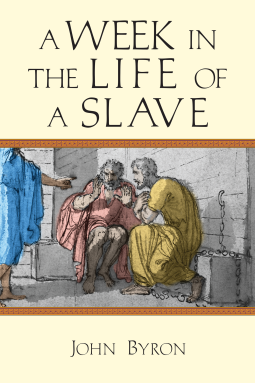
A Week in the Life of a Slave
by John Byron
This title was previously available on NetGalley and is now archived.
Send NetGalley books directly to your Kindle or Kindle app
1
To read on a Kindle or Kindle app, please add kindle@netgalley.com as an approved email address to receive files in your Amazon account. Click here for step-by-step instructions.
2
Also find your Kindle email address within your Amazon account, and enter it here.
Pub Date Jul 02 2019 | Archive Date Sep 13 2019
InterVarsity Press | IVP Academic
Talking about this book? Use #AweekInTheLifeOfAslave #NetGalley. More hashtag tips!
Description
"I appeal to you for my son Onesimus, who became my son while I was in chains. Formerly he was useless to you, but now he has become useful both to you and to me."
These words, written by the apostle Paul to a first-century Christian named Philemon, are tantalizingly brief. Indeed, Paul's epistle to Philemon is one of the shortest books in the entire Bible. While it's direct enough in its way, it certainly leaves plenty to the imagination.
A Week in the Life of a Slave is a vivid imagining of that story. From the pen of an accomplished New Testament scholar, the narrative follows the slave Onesimus from his arrival in Ephesus, where the apostle Paul is imprisoned, and fleshes out the lived context of that time and place, supplemented by numerous sidebars and historical images. John Byron's historical fiction is at once a social and theological critique of slavery in the Roman Empire and a gripping adventure story, set against the exotic backdrop of first-century Ephesus.
Advance Praise
"There's no one better to take us into the daily plight and experiences of a first-century Roman slave than John Byron, who has distinguished himself as a specialist in this area through two important academic books and several articles. Here he blends expertise and imagination together in a winsome invitation into the lives of Paul, Philemon, and, most importantly, Onesimus, the slave whose coming to faith challenged Philemon to live up to his own."
-David A. deSilva, author of Day of Atonement: A Novel of the Maccabean Revolt
"We underestimate the power of a well-told story in order to reconstruct the historical drama of the New Testament. John Byron shows himself not only to be a fantastic storyteller but a creative scholar who provides cultural insights into Paul's world that we would not otherwise understand. We follow the slave Onesimus as he leaves his home, meets Paul, and eventually becomes a Christian leader renowned in Asia Minor. Any student studying the New Testament will find this book both riveting and a rich invitation to enter the New Testament world."
-Gary M. Burge, professor of New Testament, Calvin Theological Seminary
"John Byron has written an imaginative and historically informed novella about slavery in the ancient world, specifically in the early church. He takes you into the story of Paul, Philemon, Onesimus, the cities of Asia Minor, and the plight of slaves. It is filled with information about the ancient world, living conditions, gods and deities, travel, and what it was like to be a slave in the first century. Byron is one person I know with the knowledge of Greco-Roman slavery and the literary brilliance to make a book like this both fun to read and genuinely educational. A must-read!"
-Michael F. Bird, lecturer in theology at Ridley College, Melbourne, Australia
"In the New Testament, Paul's letter to Philemon is rather small—a mere page or two. But Byron has managed to reveal a massive world of Paul's imprisonment, busy ministry work in the Lycus valley, broken relationships, new friendships, and the messy reality of life in first-century churches, full of both mundane problems but also great beauty and grace. Learning through story is a gift for the learner, and Byron is an excellent teacher."
-Nijay K. Gupta, associate professor of New Testament, Portland Seminary
Available Editions
| EDITION | Other Format |
| ISBN | 9780830824830 |
| PRICE | $21.99 (USD) |
| PAGES | 132 |
Links
Average rating from 12 members
Featured Reviews
 Deborah W, Reviewer
Deborah W, Reviewer
This book is partly fiction and partly nonfiction. It read like a documentary show that's primarily made up of fictional reenactments to illustrate the points. The purpose was to educate readers (in an entertaining way) about the social and cultural background to Paul's letter to Philemon so that we can better understand it.
The story followed a week in the life of a runaway slave, Onesimus, as well as details about Paul's life in prison and the people in Ephesus who owned slaves. A lot of educational material was worked into the story, but additional information was provided in "sidebars" (which could take up whole pages) that were placed within the story. The book included some pictures of archaeological artifacts that illustrated information in the non-fiction sidebars or events in the story. Overall, I'd recommend this book to people interested in the insights gained from cultural background information.
 Phillip C, Reviewer
Phillip C, Reviewer
The book of Philemon is often used in studies on forgiveness. Not much is written for us to know the backstory. All we know is that Onesimus was absent from the house of Philemon, and Paul wrote on his behalf. One might wonder what happened to lead up to the letter. In A Week in the Life of a Slave, John Byron writes a scenario that could have happened, based on what is known.
Besides the story, the book contains small sections that tell more about life in the time the events take place. How slaves were treated, what life was like for people, and other information is provided that give you a better understanding of what happens in the plot. They add another level to what you can get out of the book.
I enjoyed reading A Week in the Life of a Slave, but not just for the story. I've read Philemon several times, but this gave me something more to consider. Throughout the New Testament, there are warnings about showing favoritism and treating others how you want to be treated. This book can make you stop and think about how you are treating fellow believers.
I received a complimentary copy from the publisher through NetGalley. All opinions are my own.
 Sergiu P, Reviewer
Sergiu P, Reviewer
As with previous books, this is a great way to understand the slave situation in biblical times. The author takes a narrative approach and does a good job. I think he achieves his intent.
The “Week in the Life” books are an excellent, pain free way to learn about the context around the New Testament, and this book is no exception. Perhaps better than others, John Byron manages to keep the interest and tension of the plot going, while still covering a lot of ground around the background of slavery in the time when the letter of Philemon was written. The side boxes are interesting and informative, not only for understanding Philemon, but also providing a light into many of the New Testament writings.
The only thing I found a little disappointing was the sudden finish. The book is short and pacey, and I would have liked an expansion on the resolution.
I would recommend this book to anyone keen to learn more about the social context of the New Testament.
 Janet P, Reviewer
Janet P, Reviewer
A short but excellent book that constructs a back story to St. Paul's letter to Philemon. In it, one of Philemon's slaves runs away and ends up in Ephesus where he encounters Paul & the Christian community there. In the course of his time there he is converted and is sent back to his master along with a letter that later became incorporated into the Bible.
Not only was the story delightful, but I also liked that Byron helped modern readers understand the context with many sidebars that provided illumination into both Roman society and its slaves. It's an excellent book illuminating this letter to laypeople.
This is an excellent offering by John Byron in the “A Week in the life of…” series. This is a fictional rendering of the life of Onesimus a runaway slave who is mentioned in the book of Philemon. The book has lots of historical nuggets in side panels offered throughout. It offers an eye opening look into what it meant to be a household slave in the first century and it offers some insight into Paul’s situation as a prisoner at that times. If you read this book go back and read the book of Philemon with new eyes.
Thanks to #Netgalley for the ARC copy.
What was it like to be a slave in Roman times? What was it like to be a slave or slave owner in a Christian home during that time? These are questions that John Byron attempts to answer in A Week in the Life of a Slave. This new book, mostly fiction with sidebars of facts and the author’s opinions, is based upon Paul’s letters to the Colossians and Philemon in the New Testament. The letter to Philemon is an oddity; it’s a personal letter written by Paul about a runaway slave named Onesimus who had run away from his master. Byron’s book speculates as to how this letter came to be, along with his opinion that Paul was actually in prison in Ephesus at the time he wrote it.
The story itself is fairly straightforward. It covers Paul’s interactions with the runaway, and also includes a storyline about whether or not slaves should attend meetings of the early church and eat besides their masters. That was a controversial issue at the time: when Paul spoke of being brothers and sisters in Christ, did he also mean slaves being on the same level as their masters? While slavery in Roman times was much different to the form of slavery we’re familiar with in this country’s sad history, Byron is careful to note that this doesn’t mean it was better. Slavery is slavery, no matter where it happens or when it happens.
A Week in the Life of a Slave is easy to read and digest. The factual sections do intersect the narrative, so I’d recommend reading in paper form, when you can place a finger or a bookmark wherever you come across these sections and return to them at a more suitable moment. But then, I’m still a lover of the traditional book and have never quite mastered the skill of skipping back and forth while reading on a screen. Regardless of which format you go for, however, you’ll enjoy this informative component of the A Week in the Life series of which this is part.
Thank you to IVP for my complimentary electronic copy of A Week in the Life of a Slave.
Readers who liked this book also liked:
Robert Williamson Jr.
Christian, Nonfiction (Adult), Religion & Spirituality


















